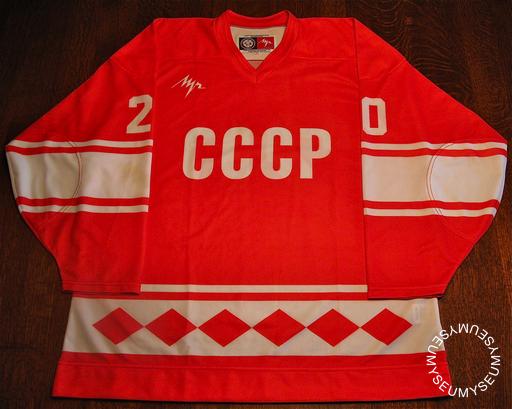Submitted by Jocelyn on Feb, 08
Breaking the Ice with a Shared Hockey Heritage
When Luba’s west-end Toronto neighbourhood announced that its annual Solstice Party would be retro themed, she was at a loss as to what to wear. When immigrating to Toronto from Russia in 1998, she and her family brought very little clothing with them. And of that, none of it was old enough to qualify as “retro.” So she pulled out her recently purchased hockey jersey, a replica of one worn in the 1970s by the Soviet Union’s national team.
Her outfit was an instant hit at the party.
Like many immigrants, Luba says, “I like to feel where I came from.” As such, she and her husband Yuri collect Russian objects. While the jersey evokes a period of their lives in the former Soviet Union, it also reminds them of the particular day in 2009 in Toronto when they bought it at a charity auction at the Hockey Hall of Fame in Toronto, hosted by the famous former Soviet goalie Vladislav Tretiak.
Whenever friends host parties to watch Team Canada play hockey, Yuri now proudly wears his red Soviet jersey, no matter whom Canada’s up against. And why wear any old Soviet jersey, when you can wear the jersey worn by Tretiak who countered shots attempted by some of Canada’s greatest players during his career?
It’s a humorous jab at his friends’ confidence in the national team, reminding them that Canada’s hockey supremacy is not absolute. Despite sportswriters predicting an easy victory for Canada in the historic eight-game Summit Series with the Soviet Union in 1972, by the end of the tournament’s first game (Soviet Union 7 – Canada 3), it seemed Tretiak and the Soviets might give the Canadians a run for their money.
Tretiak’s skill as goaltender helped the Soviets force Canada to a suspenseful final game. As the tied last period waned, for the millions of Canadians anxiously glued to their televisions and radios in their school gymnasiums, offices and homes, he was the man to beat.
When Canada’s Paul Henderson scored the winning goal in the last minute of play against Tretiak, it became a never-to-be-forgotten moment of national triumph. It confirmed Canada’s self-image as a great hockey nation. To this day, the Summit Series remains etched in Canada’s collective consciousness.
Despite the loss, Tretiak became a hero across the Soviet Union and garnered the respect of Canadians as well. He went on to win three Olympic gold medals and eight world championships between 1972 and 1983. As Luba notes, in Canada, more than any other Soviet athlete or politician, “everyone knows him.” She and her husband feel proud wearing Tretiak’s jersey around other Canadians because he espouses sportsmanship and presents “a good image of Russia” to the world.

